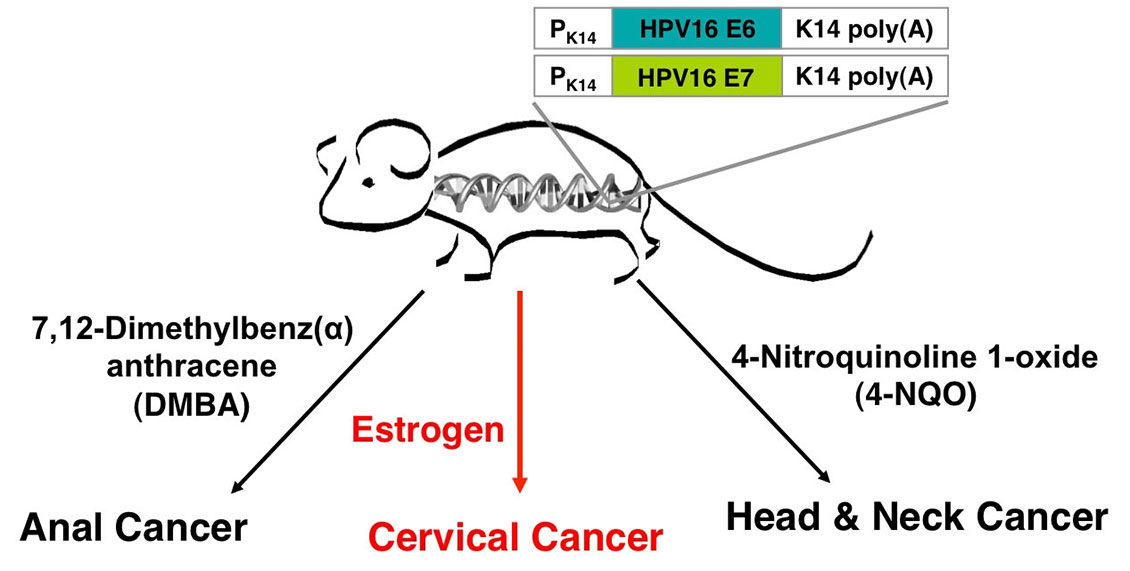Faculty Profile
 Sanghyuk Chung
Sanghyuk Chung
Associate Professor
Department of Biology and Biochemistry
Research Division: Cell and Molecular Biology (Primary)
Office: Science & Engineering Research Center, 3008
Contact: schung@uh.edu - 832-842-8181
Education: Ph.D., Baylor College of Medicine, M.S., Korea University, B.S., Korea University
Mechanisms of ERα and PR in HPV-associated cervical cancer
Human papillomaviruses (HPVs) cause various human cancers including those in the uterine cervix. The tumorigenic potential of HPV mainly stems from E6 and E7 viral oncoprotein, which inactivate p53 and pRb, respectively. Evidence indicates that, while HPV is necessary, it is not sufficient for cervical cancer. Studies using the HPV transgenic mice expressing E6 and E7 have demonstrated that estrogen and estrogen receptor α (ERα) are required for the development of cervical cancer. Dr. Sanghyuk Chung’s lab also demonstrated that progesterone and progesterone receptor (PR) inhibit cervical cancer. ERα and PR are transcription factors that belong to the nuclear receptor superfamily, which has been successfully targeted for various diseases including cancers. The lab’s primary interest is to understand molecular mechanisms by which ERα and PR exert opposing roles in cervical cancer using the HPV transgenic mouse model and the lab’s novel orthotopic xenograft mouse model. Chung anticipates that the studies will not only shed new light on pathogenesis of HPV-associated cervical cancer but also identify therapeutic targets for the cancer.

HPV is not sufficient for carcinogenesis. Transgenic mice expressing HPV E6 and/or E7 succumb to relevant cancers only when treated with a cofactor. DMBA treatment on the anal tissue causes anal cancer. Systematic estrogen treatment results in cervical cancer. Head and neck cancer occurs in mice drinking 4-NQO containing water.
- Mehta, F. F., Son, J., Hewitt, S. C., Jang, E., Lydon, J. P., Korach, K. S., and Chung, S. H. 2016. Distinct functions and regulation of epithelial progesterone receptor in the mouse cervix, vagina, and uterus. Oncotarget. 7(14):17455-17467.
- Chung, S.H. 2015. Targeting female hormone receptors as cervical cancer therapy. Trends Endocrinol. Metab. 26: 399-401.
- Son, J., Park, J. W., Lambert, P. F., and Chung, S. H. 2014. Requirement of estrogen receptor alpha DNA-binding domain for HPV oncogene-induced cervical carcinogenesis in mice. Carcinogenesis. 35: 489-496.
- Spurgeon, M. E., Chung, S. H., and Lambert, P. F. 2014. Recurrence of cervical cancer in mice following selective estrogen receptor modulator therapy. Am. J. Pathol. 184: 530-540 (issue highlight).
- Yoo Y. A., Son, J., Mehta, F. F., DeMayo, F. J., Lydon, J. P., and Chung, S. H. 2013. Progesterone signaling inhibits cervical carcinogenesis in mice. Am. J. Pathol. 183: 1679-1687 (issue highlight).
- Ivanova, M. M., Radde, B. N., Son, J., Mehta, F. F., Chung, S. H., and Klinge, C. M. 2013. Estradiol and tamoxifen regulate NRF-1 and mitochondrial function in mouse mammary gland and uterus. J. Mol. Endocrinol. 51: 233-246.
- Chung, S. H., Shin, M. K., Korach, K. S., and Lambert, P.F. 2013. Requirement for Stromal Estrogen Receptor Alpha in an Estrogen-Dependent Cervical Neoplasia. Horm. Cancer. 4: 50-59.
- Bonilla-Delgado J., Bulut, G., Liu, X., Cortés-Malagón, E. M., Schlegel, R., Flores-Maldonado, C., Contreras, R. G., Chung, S. H., Lambert, P. F., Uren, A., and Gariglio, P. 2012. The E6 Oncoprotein from HPV16 Enhances the Canonical Wnt/β-catenin Pathway in Skin Epidermis in vivo. Mol. Cancer Res. 10: 250-258 (cover article).
- Chung, S. H., Franceschi, S., and Lambert, P. F. 2010. Estrogen and ERα: Culprits in cervical cancer? Trends Endocrinol. Metab. 21: 504-511.
- Chung, S. H. and Lambert, P. F. 2009. Prevention and Treatment of Cervical Cancer in Mice Using Estrogen Receptor Antagonists. Proc. Natl. Acad. Sci. U.S.A. 106: 19467-19472 (issue highlight).
- Chung, S. H., Wiedmeyer, K., Shai, A., Korach, K. S., Lambert, P. F. 2008. Requirement for Estrogen Receptor Alpha in a Mouse Model for Human Papillomavirus-Associated Cervical Cancer. Cancer Res. 68: 9928-9934 (issue highlight).
- Chung, S. H., Weiss, R. S., Frese, K. K., Prasad, B. V. V., and Javier, R. T. 2008. Functionally Distinct Monomers and Trimers Produced by a Viral Oncoprotein. Oncogene. 27: 1412-1420.
- Chung, S. H., Frese, K. K., Weiss, R. S., Prasad, B. V. V., and Javier, R. T. 2007. A New Crucial Protein-Interaction Element That Targets the Adenovirus E4-ORF1 Oncoprotein to Membrane Vesicles. J. Virol. 81: 4787-4797.
- Frese, K. K., Latorre, I. J., Chung, S. H., Caruana, G., Bernstein, A., Jones, S. N., Donehower, L. A., Justice, M. J., Garner, C. C., and Javier, R. T. 2006. Oncogenic Function for the Dlg1 Mammalian Homolog of the Drosophila Discs-Large Tumor Suppressor. EMBO J. 25: 1406-1417.
Honors and Awards:
Minority−Serving Institution Faculty Scholar in Cancer Research Award, American Association for Cancer Research, 2013 & 2014
New Faculty Award, University of Houston, 2011
Noonan Award, Department of Molecular Virology & Microbiology, Baylor College of Medicine, 2008
Bioneer Award, Korean−American Biomedical Scientists Symposium, Houston, TX, 2006
Ilju Scholarship for International Graduate Student, Ilju Academic and Cultural Research Foundation, Seoul, Korea, 2000−2005